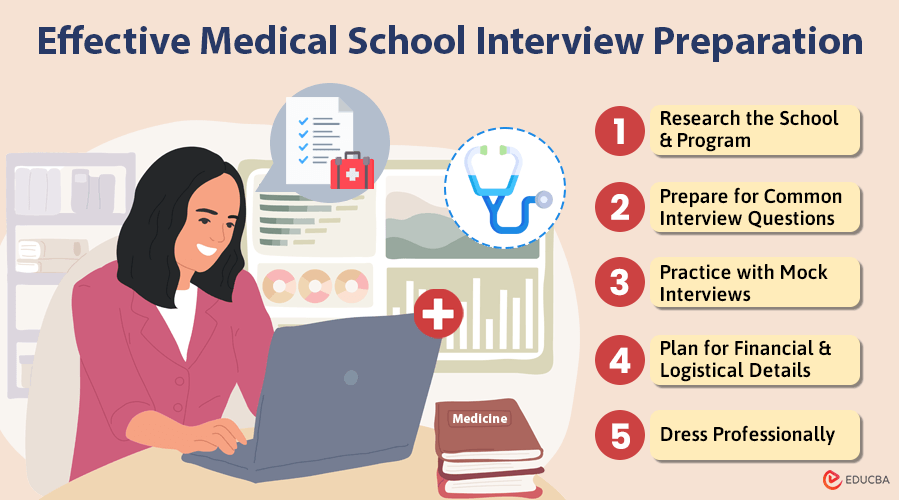How to Prepare for Med School Interviews?
Medical school interviews are a crucial part of the admissions process, allowing schools to evaluate applicants beyond academic achievements. These interviews assess key qualities such as communication skills, critical thinking, motivation, and readiness for the challenges of a medical career. Proper medical school interview preparation is essential to stand out and make a lasting impression. This guide will cover essential steps to help you prepare confidently and strategically for your interview.
Steps for Effective Medical School Interview Preparation
Proper preparation is essential to succeeding in your medical school interview. It will help you make a lasting impression and demonstrate your readiness for a career in medicine.
#1. Research the School and Program
Understanding the medical school’s unique approach is critical to your interview preparation. Each school has its values, curriculum, and focus areas. Researching these can help tailor your responses to align with the school’s mission.
- Mission and Values: Explore the school’s mission statement and educational philosophy. This shows that you understand and align with the school’s values.
- Programs and Research: Look into specialized programs, faculty research areas, and clinical training. Mentioning these in your responses can demonstrate a genuine interest in the school.
- Community Engagement: Many schools emphasize working with underserved communities or technological advancements. Referencing these aspects can help you show your proactive approach to medicine.
#2. Prepare for Common Interview Questions
During your medical school interview, the interviewer will ask questions to assess your motivations, experiences, and ethical perspectives. Preparing for these questions is a key part of the process.
- Common Questions: Expect questions like “Why do you want to pursue medicine?” or “What are your strengths and weaknesses?”. These require deep reflection and thoughtful responses.
- Use the STAR Method: For questions about past experiences, structure your answers with the STAR method (Situation, Task, Action, Result) to show your problem-solving skills and growth.
- Ethical Scenarios: Be ready for questions about ethical dilemmas, such as handling conflicts in a healthcare setting. Familiarize yourself with principles like patient autonomy and beneficence.
#3. Practice with Mock Interviews
Mock interviews are a great method to boost your self-esteem and performance.
- Simulate Real Interviews: Practicing with advisors, mentors, or peers can help you get used to answering questions in a real interview setting.
- Get Feedback: Recording mock interviews allows you to identify areas for improvement, such as body language and response pacing.
- Reduce Anxiety: Practicing under interview conditions can reduce stress and make you more comfortable when the real interview arrives.
#4. Plan for Financial and Logistical Details
Logistics and financial planning are essential aspects when choosing a medical school.
- Budgeting: Depending on the interview location, you may need to budget for airfare, accommodation, and meals. Plan ahead to keep costs under control.
- Travel Assistance: While companies like MPOWER Financing can assist with financing medical school after acceptance, the significant costs of applying and interviewing are often expenses you must handle alone.
- Logistical Details: Confirm the interview location, transportation options, and any documents you must bring. Arriving a day early can help you get familiar with the setting and reduce stress.
#5. Dress Professionally
Your attire is crucial to preparing for the Medical School Interview Process. First impressions matter, and Professional attire helps set the right tone.
- Choose Conservative Business Attire: An ideal business attire is a well-fitted suit or dress in neutral colors like black, navy, or gray.
- Pay Attention to Details: Along with your attire, pay attention to your body language. Maintain eye contact, shake hands firmly, and sit confidently.
- Positive Attitude: A friendly and respectful attitude helps create a strong first impression and sets a positive tone for the interview.
Final Thoughts
Effective medical school interview preparation can make all the difference in securing a place at your desired institution. By researching the school, practicing common questions, and managing logistics, you can present yourself as a confident, well-prepared candidate. By presenting yourself professionally and offering thoughtful responses, you will make a lasting impression and move one step closer to becoming a doctor.
Recommended Articles
We hope this guide to medical school interview preparation boosts your confidence and helps you tackle even the toughest questions with ease. Check out these recommended articles for more tips and strategies to impress your interviewers and stand out as a candidate.


